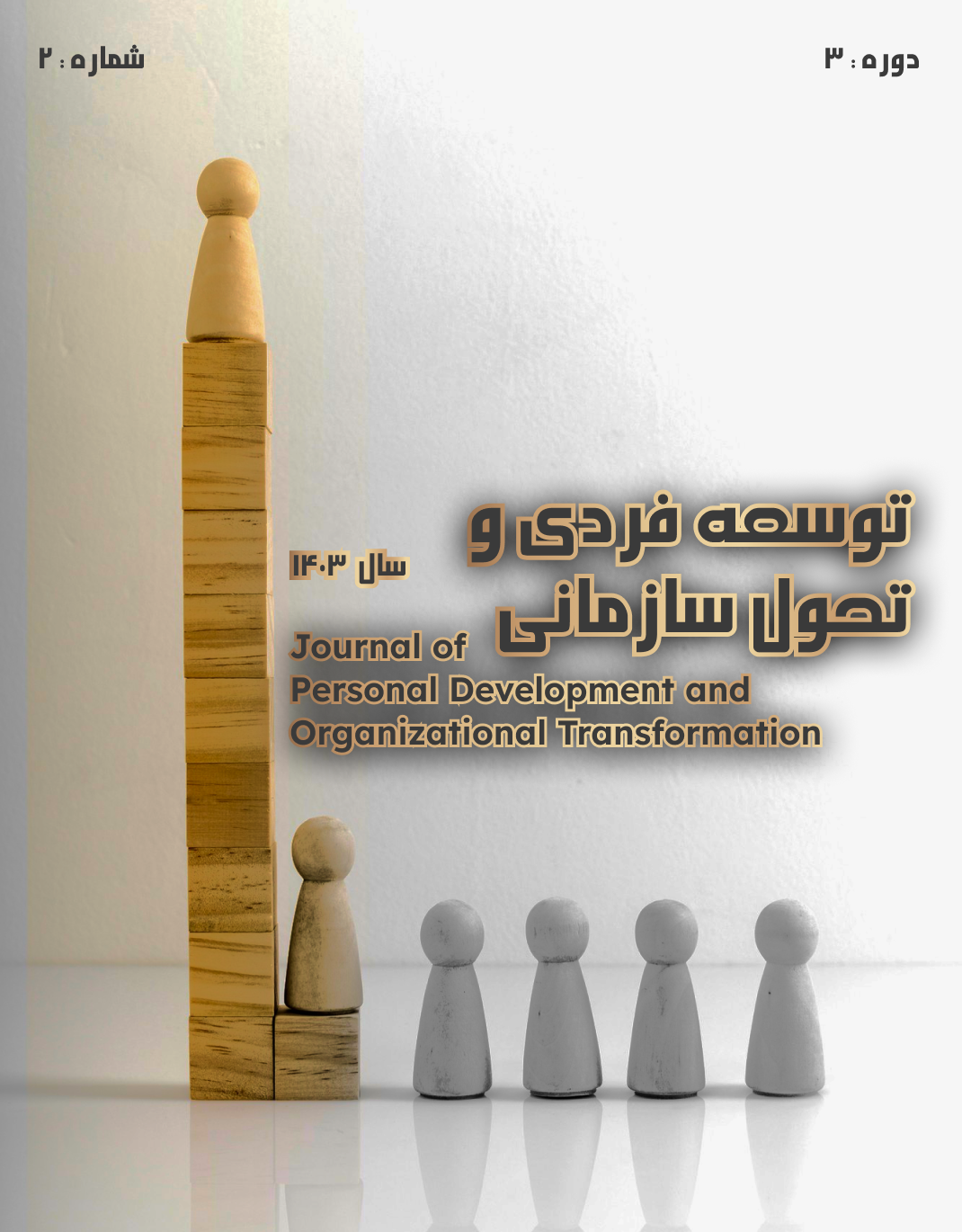شناسایی پیشایندها و پسایندهای نادانی تکثرگرا در سازمانهای دولتی
کلمات کلیدی:
نادانی تکثرگرا, گروه اندیشی هنجار گرایانه, گروه اندیشی سازش گرایانه, گروه اندیشی انفعالی، سازمان¬های دولتیچکیده
هدف پژوهش حاضر طراحی مدل نادانی تکثرگرا در سازمانهای دولتی میباشد. این پژوهش با رویکرد کیفی و روش تحلیل مضمون انجام شده است. جامعه آماری در بخش کیفی تحقیق(در مرحله دلفی)، جهت انجام پایش مولفههای بدست آمده از طریق روش تحلیل مضمون، شامل 15 نفر از خبرگان و صاحب نظران آشنا با حوزه مدیریت رفتاری و منابع انسانی در دانشگاهها و سازمانهای دولتی میباشد. در این پژوهش ابتدا مبانی نظری نادانی تکثرگرا بررسی شده است. در مرحله دوم جهت گردآوری اطلاعات از ابزارها و روشهای مختلفی چون روشهای کتابخانه ای، استفاده از کتب، پایان نامهها و نشریات(شامل مقالهها و پایان نامههایی است که از سال 2010 تا 2024 میلادی و از سال 1390 تا 1403 شمسی بر روی پایگاههای معتبر داخلی و خارجی قرار دارند)، استفاده شده است. نتایج نشان داد که براساس نمودار قدرت نفوذ-وابستگی کلیه متغیرهای پسایندها و پیشایندها دارای قدرت نفوذ بالا و تأثیرپذیری بالایی هستند بنابراین متغیرهای پیوندی محسوب میشوند؛ و فقط متغیرهای مارپیچ سکوت(C1)، خلاء حمایت سازمانی ادراک شده(C12)، گروه اندیشی(C14) و هویت گروهی(C16) میزان وابستگی بالا و قدرت نفوذ کمتری دارد، بنابراین متغیر وابستگی محسوب میشود. در نهایت مدل پیشایندها و پسایندها نیز ارائه شده است.
دانلودها
مراجع
Bilkis Seeme, F. (2020). Agent-Based Modelling of Pluralistic Ignorance in Social Systems A thesis submitted for the degree of Doctor of Philosophy at Monash University in Faculty of Information Technology]. https://bridges.monash.edu/articles/thesis/Agent_Based_Modelling_of_Pluralistic_Ignorance_in_Social_Systems/14714775
Bjerring, J. C., Hansen, J. U., & Pedersen, N. J. L. L. (2014). On the rationality of pluralistic ignorance. Synthese, 191(11), 2445-2470. https://doi.org/10.1007/s11229-014-0434-1
Efthymiopoulos, A. (2024). Organizational Silence and Organizational Commitment: Empirical Evidence From the Greek Public Sector. Journal of Applied Social Science, 18(3), 346-363. https://doi.org/10.1177/19367244241263576
Ersen, N., Usta, U. C., Bayram, B. Ç., & Akyüz, İ. (2023). Intermediate Role of Presenteeism in Relationship Between Organizational Stress and Organizational Silence. Drvna Industrija, 74(2), 183-194. https://doi.org/10.5552/drvind.2023.0046
Fuller, J. K. (2023). An analysis of the social dynamics in boardrooms: Chairperson leadership, pluralistic ignorance and demographic faultlines Master thesis, Philosophy (Accountancy), Queensland University of Technology]. https://eprints.qut.edu.au/240794/
Halbesleben, J. R., Buckley, M. R., & Sauer, N. D. (2004). The role of pluralistic ignorance in perceptions of unethical behavior: An investigation of attorneys' and students' perceptions of ethical behavior. Ethics & Behavior, 14(1), 17-30. https://doi.org/10.1207/s15327019eb1401_2
Halbesleben, J. R. B., Wheeler, A. R., & Buckley, M. R. (2005). Everybody Else is Doing it, So Why Can't We? Pluralistic Ignorance and Business Ethics Education. Journal of Business Ethics, 56, 385-398. https://doi.org/10.1007/s10551-004-3897-z
Jalonen, H. (2023). Ignorance in organisations: a systematic literature review. Management Review Quarterly. https://doi.org/10.1007/s11301-023-00321-z
Kettaf, R. (2024). Investigating the Impact of Organizational Climate on Organizational Silence in Higher Education Institutions. Socioeconomic Challenges, 8(1), 170-182. https://doi.org/10.61093/sec.8(1).170-182.2024
Matsson, A. (2023). How to Organize Silence at work: An Organizational Politics Perspective on Pragmatic Mistreatment at work. Employee Responsibilities and Rights Journal, 1-29. https://doi.org/10.1007/s10672-023-09454-5
Mehdizadeh, I., Rajaeepor, S., & Siadat, S. A. (2023). Organizational Silence and Positive Leadership Strategies: The Mediating Role of Psychological Empowerment. Journal of Public Administration, 15(1), 67-93. https://www.sid.ir/paper/1093221/fa
Mohammadi, M., Hassanpour, A., Jafarinejad, S., & Rangriz, H. (2022). The Impact of Pluralistic Ignorance on Organizational Knowledge Management Based on a Meta-Analytical Approach. Quarterly Journal of Public Policy in Management, 13(47), 257-239. https://civilica.com/doc/1569089/
Munsch, C. L., & O'Connor, L. T. (2018). What I Think You Think about Family and Work: Pluralistic Ignorance and the Ideal Worker Norm (Vol. 13). The Work-Family Interface: Spillover, Complications, and Challenges Contemporary Perspectives in Family Research. https://doi.org/10.1108/S1530-353520180000013019
Munsch, C. L., Ridgeway, C. L., & Williams, J. C. (2014). Pluralistic ignorance and the flexibility bias: Understanding and mitigating flextime and flexplace bias at work. Work and Occupations, 41, 40-62. https://doi.org/10.1177/0730888413515894
Plesner, U., & Justesen, L. (2021). Digitalize and Deny: Pluralistic Collective Ignorance in an Algorithmic Profiling Project. Ephemera: Theory & Politics in Organization, 23(1), 19-48. https://www.cbs.dk/en/research/departments-and-centres/department-of-organization/staff/upioa
Sakr, E. (2023). The Relation Between Organizational Silence and Organizational Learning Among Nurses. Menoufia Nursing Journal, 8(4), 254-270. https://doi.org/10.21608/menj.2023.343403
Sargent, R. H., & Newman, L. S. (2021). Pluralistic Ignorance Research in Psychology: A Scoping Review of Topic and Method Variation and Directions for Future Research. Review of General Psychology, 25(2), 1-22. https://doi.org/10.1177/1089268021995168
Sufi, A. F., Raja, U., & Butt, A. N. (2023). Impact of Peer Unethical Behaviors on Employee Silence: The Role of Organizational Identification and Emotions. Journal of Business Ethics, 1-19. https://doi.org/10.1007/s10551-023-05397-x
Swim, J. K., Gervais, S. J., Pearson, N., & Stangor, C. (2009). Managing the message: Using social influence and attitude change strategies to confront interpersonal discrimination. Cambridge University Press. https://doi.org/10.1017/CBO9780511804465.004
Taheri, F. (2019). Examining Pluralistic Ignorance in Organizations: Antecedents and Consequences. Quarterly Journal of Organizational Behavior Studies, 8(2), 150-125. https://www.sid.ir/paper/245473/fa
Yazdani, F., Noori, H., & Khalaf, M. (2024). The relationship between organizational trust and organizational resilience with the perception of organizational silence among secondary school art teachers in Karbala. Educational Leadership Research, 8(29), 114-192. https://jrlat.atu.ac.ir/article_17265.html?lang=en
Zhang, W. (2024). Regulatory Focus as a Mediator in the Relationship Between Nurses' Organizational Silence and Professional Identity. Journal of Advanced Nursing, 80(9), 3625-3636. https://doi.org/10.1111/jan.16113
دانلود
چاپ شده
ارسال
بازنگری
پذیرش
شماره
نوع مقاله
مجوز
حق نشر 2025 فاطمه نبی زاده شهربابکی (نویسنده); حمید تابلی; ملیکه بهشتی فر (نویسنده)

این پروژه تحت مجوز بین المللی Creative Commons Attribution-NonCommercial 4.0 می باشد.







